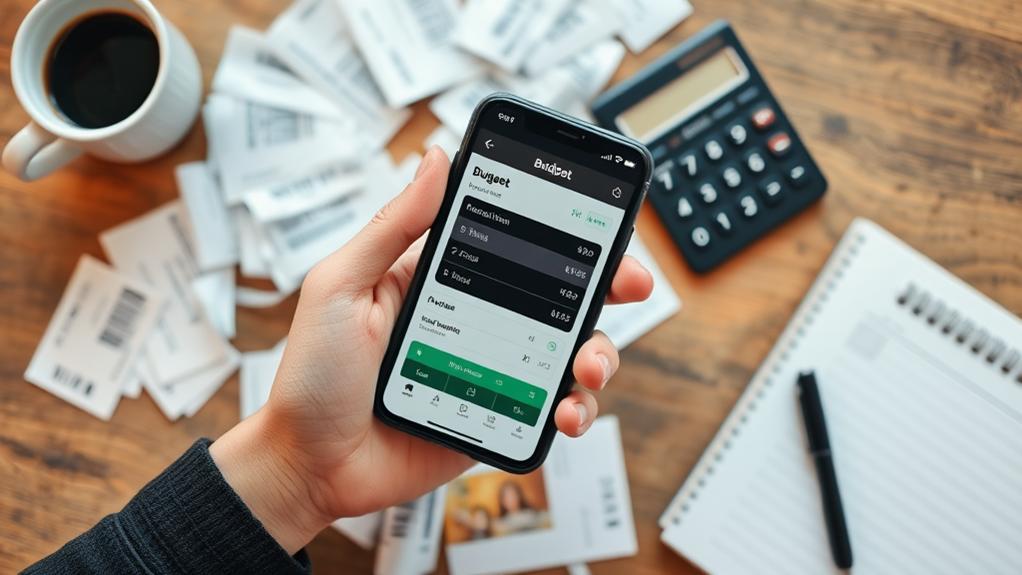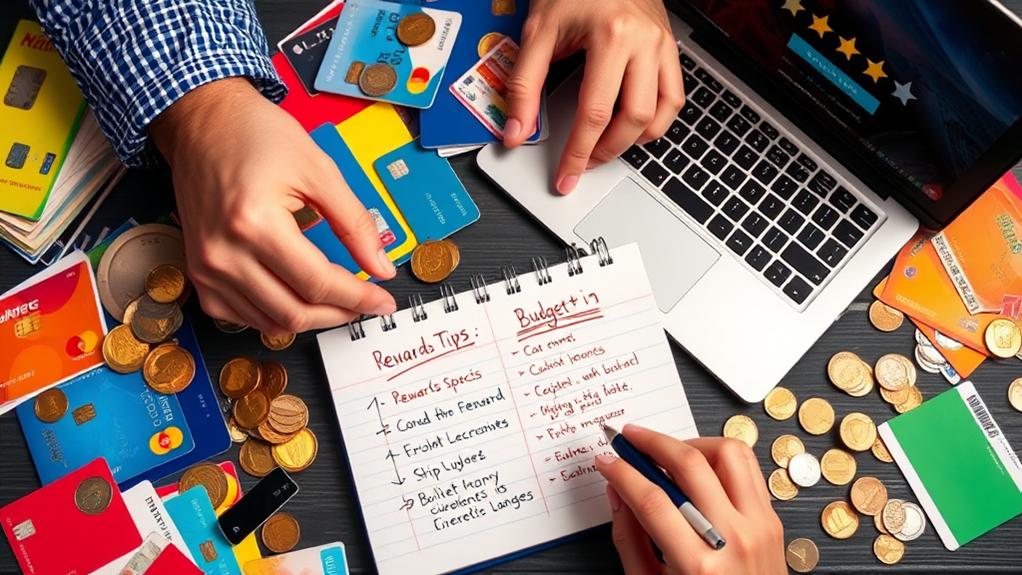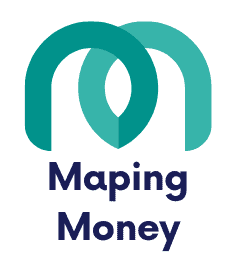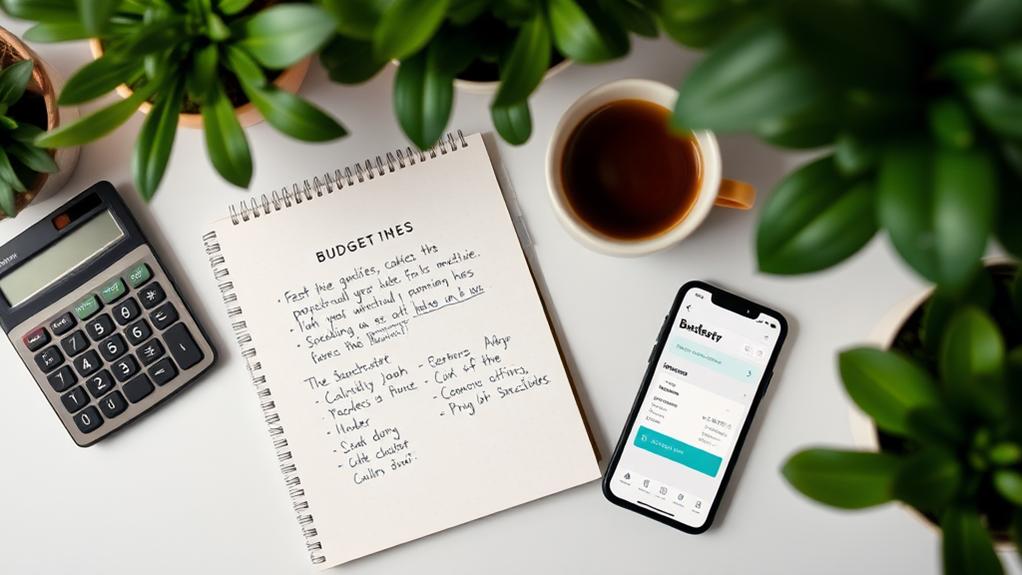10 Best Tips for Budgeting With Credit
Budgeting with credit can be a game-changer for your finances. Start by understanding your credit score and set a monthly credit limit to help you spend wisely. Track your spending habits and prioritize essential expenses to stay within budget. Use rewards programs that fit your lifestyle, and avoid impulse purchases by creating a list and allowing time to think before buying. Building an emergency fund gives you peace of mind, while regularly reviewing your statements helps catch errors and aligns your spending. For more practical strategies to boost your budgeting skills, stick around to uncover additional insights.
Key Takeaways
- Set a monthly credit limit to maintain clarity on spending and avoid overspending, fostering responsible credit use.
- Track spending habits using budgeting apps to identify patterns and areas where cutbacks can be made.
- Prioritize essential expenses like housing and groceries to ensure secure living and reduce financial uncertainty.
- Pay more than the minimum on credit cards to lower interest payments and improve your credit score over time.
- Create and regularly contribute to an emergency fund, aiming for three to six months’ living expenses for added financial security.
Understand Your Credit Score
Your credit score is like a financial report card that can greatly impact your budgeting efforts. It reflects your creditworthiness and helps lenders determine if you’re a reliable borrower. Understanding your credit score is essential for achieving financial freedom and making informed decisions about your money.
First, know the factors that influence your score: payment history, credit utilization, length of credit history, types of credit, and recent inquiries. By keeping these in mind, you can take steps to improve your score and gain access to better interest rates on loans and credit cards. This means you’ll have more freedom to invest in your dreams, whether it’s a new home, a car, or even starting a business.
Next, regularly check your credit reports for inaccuracies. Errors can drag your score down and limit your opportunities. Challenge any discrepancies, as correcting them can lead to a significant boost.
Set a Monthly Credit Limit
Setting a monthly credit limit can help you manage your finances more effectively while improving your credit score. By establishing a clear boundary, you empower yourself to spend wisely and enjoy greater financial freedom. Here’s how setting that limit can transform your relationship with credit:
- Clarity: You’ll gain a clear understanding of what you can afford, freeing you from the anxiety of overspending.
- Control: With a limit in place, you’ll feel more in control of your finances, allowing you to make informed, confident decisions.
- Confidence: As you stick to your limit, you’ll build your credit score, which enhances your ability to secure loans and lower interest rates in the future.
- Liberation: You’ll experience the liberation that comes from knowing you’re living within your means, freeing you from the burdens of debt.
Setting a monthly credit limit isn’t just about restriction; it’s about creating a path to financial empowerment. By taking this proactive step, you can cultivate a healthier relationship with credit and achieve the financial freedom you desire.
Track Your Spending Habits

Many people overlook the importance of tracking spending habits, but doing so can greatly enhance your budgeting efforts. By keeping a close eye on where your money goes, you can identify patterns that may be holding you back from financial freedom. Start by recording every purchase, no matter how small. This awareness will empower you to make conscious choices about your spending.
Consider using budgeting apps or simple spreadsheets to log your expenses. These tools can help you visualize your spending and pinpoint areas where you might cut back. Look for trends—are you spending too much on takeout or impulse buys? Once you see the big picture, you can take action to align your spending with your values and goals.
Tracking your spending doesn’t just highlight problem areas; it also shows you where you’re thriving. Celebrate those wins! Every dollar saved is a step closer to the liberation you seek. Remember, it’s about progress, not perfection. The more informed you are about your habits, the more control you’ll gain over your financial choices, setting you up for a brighter, more empowered future.
Prioritize Essential Expenses
When it comes to budgeting, prioritizing essential expenses can make a significant difference in managing your finances effectively. It’s all about guaranteeing that your basic needs are met first, allowing you the freedom to enjoy life without the constant stress of financial uncertainty.
Here’s how to identify and prioritize those essential expenses:
- Housing: Guarantee you have a safe and secure place to live. Pay your rent or mortgage first.
- Utilities: Keep the lights on and the heat running. Budget for electricity, water, and gas.
- Groceries: Nourish your body with healthy food. Allocate funds for your monthly grocery needs.
- Transportation: Whether it’s gas for your car or public transport, make sure you can get where you need to go.
Use Rewards Wisely

Using rewards wisely can greatly enhance your budgeting strategy, particularly if you regularly use credit cards or loyalty programs. Start by choosing cards that align with your spending habits. If you love dining out, opt for a card that offers cash back or points for restaurant purchases. This way, you’re earning rewards on expenses you’d pay anyway.
Next, track your rewards. Set reminders to check your points or cash back balances, so you don’t miss out on redemption opportunities. Often, rewards can expire, leaving you feeling frustrated. By keeping tabs, you’re making sure you get the most out of your efforts.
Consider using rewards to offset larger expenses. For instance, if you’re planning a vacation, use your accumulated points for flights or accommodations. This not only liberates your budget but also allows you to enjoy experiences without the financial strain.
Lastly, avoid the trap of overspending just to earn rewards. It’s tempting to chase points, but staying true to your budget is essential. Prioritize your financial goals, and let rewards enhance your journey rather than dictate your spending. Embrace the freedom that comes from smart budgeting!
Pay More Than the Minimum
Paying more than the minimum on your credit card balance can greatly boost your financial health. When you commit to paying extra, you’re not just chipping away at debt; you’re reclaiming your financial freedom. Here are four powerful reasons to take that step:
- Reduce Interest Payments: Paying more now means less interest later. You’ll save money in the long run, freeing up cash for what truly matters.
- Shorten Your Debt Timeline: By paying more, you’ll pay off your debt faster, allowing you to move on to bigger financial goals sooner.
- Improve Your Credit Score: Lowering your credit utilization ratio can greatly enhance your credit score, opening doors to better loans and rates.
- Gain Peace of Mind: The burden of debt can weigh heavy. Paying more than the minimum frees you from that anxiety, giving you the space to dream bigger.
Embrace the power of proactive payments. You deserve to feel liberated from debt and have the financial flexibility to live life on your terms. Start today, and watch your financial landscape transform!
Avoid Impulse Purchases

Impulse purchases can derail even the best budgeting plans, leading to unnecessary debt and financial stress. To achieve financial freedom, it’s vital to recognize those moments when you’re tempted to buy on a whim. Start by identifying your triggers. Are you shopping out of boredom or stress? Understanding these patterns helps you gain control.
Next, implement a cooling-off period. When you feel the urge to buy something unplanned, wait 24 hours. This gives you time to reflect on whether the purchase aligns with your financial goals. You might find that the desire fades, allowing you to save instead.
Additionally, avoid shopping when you’re hungry or emotional. These states can cloud your judgment and lead to regrettable decisions. Instead, make a list before you shop and stick to it. This keeps you focused and minimizes distractions.
Create an Emergency Fund
An emergency fund is a crucial part of your financial plan, providing a safety net for unexpected expenses like medical bills or car repairs. Without one, you might feel trapped in a cycle of debt whenever life throws you a curveball. Building this fund empowers you, giving you peace of mind and freedom.
Here are four essential steps to create your emergency fund:
- Set a Goal: Aim for three to six months’ worth of living expenses. Knowing your target gives you direction.
- Start Small: Begin with a manageable amount, like $500. This initial goal can help you feel accomplished and motivated.
- Automate Savings: Set up automatic transfers to your emergency fund. You won’t miss the money, and it builds up faster than you think.
- Reassess Regularly: As your financial situation changes, adjust your goal. Celebrate milestones and stay flexible.
Having an emergency fund not only shields you from financial stress but also empowers you to make choices aligned with your dreams. Take the leap towards financial freedom—start building your fund today!
Review Statements Regularly

Building your emergency fund lays a strong foundation for financial stability, but maintaining that security requires ongoing vigilance. One key practice you can adopt is reviewing your credit statements regularly. By doing this, you’ll not only track your spending but also identify any errors or unauthorized charges that could jeopardize your financial freedom.
When you take the time to examine your statements, you gain insight into your habits and can adjust your budget as needed. Are there recurring charges you didn’t notice before? Is there a subscription you’ve forgotten about? Spotting these details empowers you to take control of your finances and cut back on unnecessary expenses.
Moreover, reviewing your statements can help you stay on top of your credit utilization ratio, which is essential for maintaining a healthy credit score. A lower ratio shows lenders you use credit responsibly, enhancing your chances of securing favorable terms on future loans.
Educate Yourself on Credit Terms
Understanding credit terms is essential for traversing the financial landscape effectively. When you grasp these concepts, you empower yourself to make informed choices that lead to financial freedom. Here’s what you need to know:
- APR (Annual Percentage Rate): This is the cost of borrowing money, expressed as a yearly interest rate. Lower APRs mean less money out of your pocket.
- Credit Limit: This is the maximum amount you can charge on your credit card. Knowing your limit helps you avoid overspending and debt traps.
- Minimum Payment: This is the smallest amount you can pay each month. It’s tempting to pay just this, but it can lead to long-term debt.
- Credit Score: Your credit score impacts your ability to borrow money and the interest rates you’ll receive. A higher score equals better rates and terms.
Frequently Asked Questions
How Can I Improve My Credit Score Quickly?
To improve your credit score quickly, pay down existing debt, make on-time payments, and check your credit report for errors. By taking these steps, you’ll boost your score and gain financial freedom.
What Should I Do if I Exceed My Credit Limit?
If you exceed your credit limit, don’t panic. Assess your spending, pay down the balance quickly, and contact your creditor to discuss options. Taking control now will help you regain financial freedom and avoid penalties.
How Often Should I Review My Credit Report?
You should review your credit report at least once a year, as studies show 1 in 5 people have errors. Catching these mistakes can empower you to maintain your financial freedom and improve your credit score.
Can Budgeting Apps Help Manage Credit Card Spending?
Yes, budgeting apps can help you manage credit card spending. They track your expenses, set limits, and remind you of payments, empowering you to take control of your finances and avoid unnecessary debt.
What Are the Penalties for Late Credit Card Payments?
Oh, late payments? Just a delightful way to welcome hefty fees, sky-high interest rates, and a potential credit score nosedive. You’ll love the thrill of financial chaos when you miss those deadlines! Stay vigilant!





